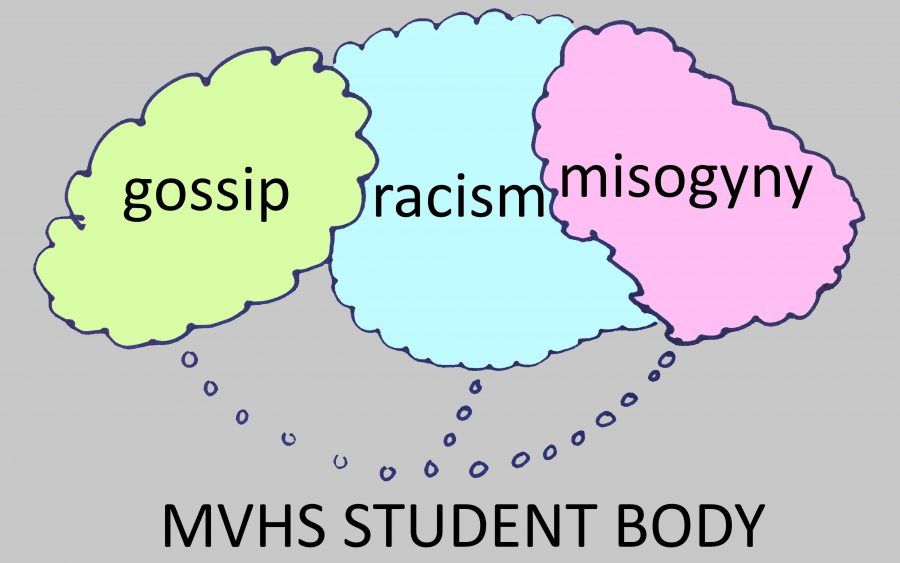Walking down the halls, I can take my pick at what I want to hear: misogyny, racism, gossip. Everyone thinks that the words they say within their small groups don’t have the power to hurt. They fall under a presumed cloak of anonymity and assume that others in passing aren’t listening or are just ignorant towards the harm they may be causing.
MVHS halls are our school’s version of locker rooms. We, as a school, let intimate conversations with our friends escalate out of control. It isn’t out of the ordinary to hear a white kid drop the n-word and then proceed to laugh about it. Misogyny and body-shaming are even worse — girls are rated on a numbers system, and guys make fun of each others’ penis sizes.
And I can’t even act like I am the exception to this rule. I am not perfect, and my friends and I sometimes take things too far. The line between funny and offensive is often blurred, as different people have different limits. What is “just a joke” to one person could really hurt someone else’s feelings, yet we oftentimes draw our own lines in the sand, and unintentionally offend others.
Unfortunately, so-called “locker room talk” is a byproduct of social interaction; it is human nature to rebel and push the boundaries as far as possible as to what we can and cannot say, and thus there will always be those who are looking to push everyone’s buttons, even if it is offending. While this is a pessimistic world view, it is the truth: not everyone is nice.
After a while, however, what once would be unacceptable works its way into normal conversation. And although offensive phrases, like the word “retard,” have entered the vocabulary of some students, the offensive connotation is still there. Just because there may not be any personal repercussions for using these slurs, they still question our morals.
Furthermore, popular culture teaches us that it is okay to degrade woman. Our music objectifies both men and women, and throws around sexual innuendos frequently. When we constantly are hearing songs that talk about how many “bitches” and “hoes” the artist has, how does this transcend into our day to day lives?
These bitches want niiiiiike… But the real ones.
— Lil Chano From 79th (@chancetherapper) July 31, 2015
The question remains though: are we being too politically correct, too sensitive? And the answer, to me, is obviously no. Who are we, as human beings, to give up on our quest for self improvement, and give the excuse of being too politically correct?
The battle against this “locker room talk” is a never-ending struggle, but history does teach us some things. One hundred years ago, it was socially acceptable for white people to say the n-word; these acts weren’t just contained to locker rooms and other private spaces. Woodrow Wilson’s favorite film “The Birth of a Nation” portrayed the Ku Klux Klan as heroes, and white actors with black facepaint played African Americans. Would the argument be political correctness if these occurred today?
We have to acknowledge that we are not perfect and learn from our mistakes. Most of all, we can’t let things slide. If your friend calls something gay, call them out on it. Don’t demonize them, but at the same time remind them of the power that their words carry. We all should be on a quest to improve ourselves and acknowledge that there is room for growth. While we can’t control the actions of others, we can control our own actions. Set the example, and others will follow.








